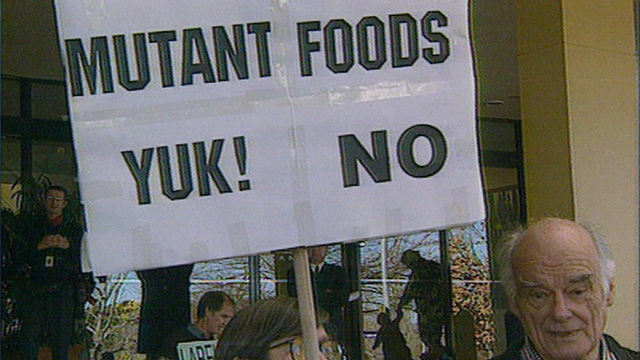Seeds of Discontent
The fight over GMOs becomes nasty
 The last great health scare of the 20th century is being played out on a global scale. Ignoring the warning signs of a doubtful public, scientists and giant food industrialists rushed to embrace the application of gene technology in our food-chain. Now, as an international consumer backlash stalls the revolution we investigate the genetically-modified food debacle.
The last great health scare of the 20th century is being played out on a global scale. Ignoring the warning signs of a doubtful public, scientists and giant food industrialists rushed to embrace the application of gene technology in our food-chain. Now, as an international consumer backlash stalls the revolution we investigate the genetically-modified food debacle.
The fall-out began with Dr Putzsai, the man whose much-debunked experiment found that rats' immune systems were damaged after being fed GM modified potatoes. Still standing by his results he continues to cast doubt on GM food safety. "If you release something to the general population and it has not been properly tested in advance then it's the human population which is taking the place of the guinea pigs!"
Devoid of legislation to cover the imports of these revolutionary foods, people the world over found themselves consuming tomatoes with fish genes and copious quantities of US GM Soya. Regulators worked simply on the assumption that GM Food was the same as ordinary food, a policy borrowed directly from the US Food and Drug Administration. Inspired by Putzsai's rats, eco-warriors in Britain took up the GM-mantle with Monsanto playing the part of the corporate bogeyman. Dramatic pictures capture one of their many assaults on experimental crops.
Against the clamour GM scientists have been quick to defend their biological brainchilds. Monsanto claim GM technology could relieve third world hunger. Yet such altruistism has been backing by a huge commercial drive. We reveal the secret trails in Australia where Monsanto teamed up with Australian government researchers to battle the one of cotton's most destructive pests, helioths. Bringing the bug under control could guarantee the cotton industries future. But several harvests on the farmers who bought into Monsanto's helioth-proof cotton are disappointed. "After two months it was clear that the product just wasn't as effective as they claimed." But Monsanto's commercial muscle over the seed market ensured the continued success of their product despite questionable benefits. Monsanto defend initial failures as teething problems. "I think you'll find, three years out, most growers are pretty happy with their product."
Now supermarkets are exploiting the public's fear of GM Foods by launching GM free labels. While organic produce has never had it so good there is dismay that the real GM debate is being stifled for short-term solutions.
Produced by ABC Australia, Journeyman Pictures
FULL SYNOPSIS
